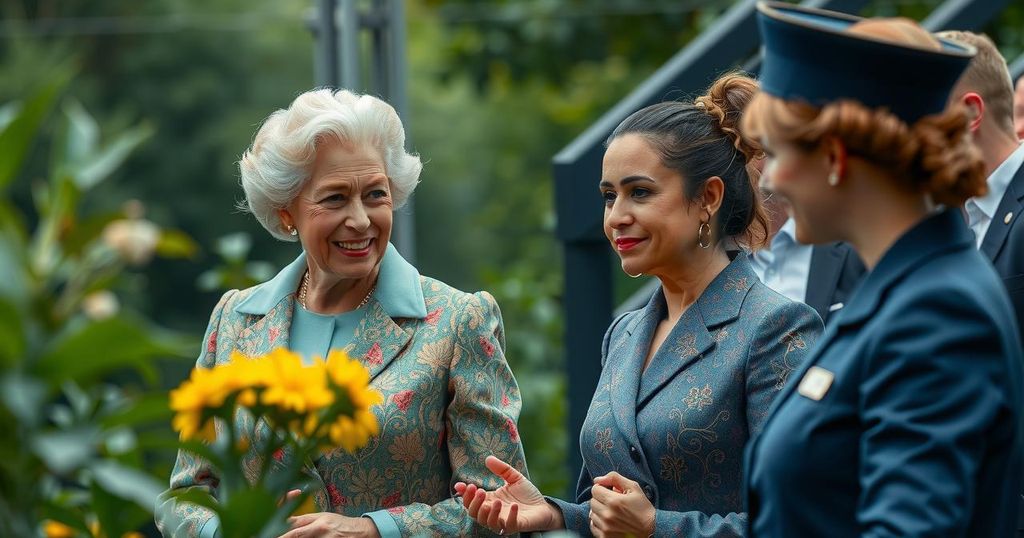The Collective Responsibility to Combat Climate Change

The article advocates for the necessity of collective action against climate change, highlighting Prince William’s role in improving energy efficiency in his properties amidst his anti-homelessness campaign. It also addresses the implications of the upcoming U.S. elections on international relations and environmental policies, emphasizing corporate responsibility in protecting waterways.
Addressing climate change requires collective action from all sectors of society, including members of the royal family. The United Kingdom’s target to achieve net zero carbon emissions by 2050 is vital not only for fulfilling international legal obligations but also for fostering an economic recovery. The anticipated low growth outlined in the latest budget emphasizes the need for leaders, such as Keir Starmer, to intensify their efforts in transforming Britain into a leading clean energy hub. This transition is expected to generate approximately 650,000 jobs and enable British enterprises to excel in green technologies, ultimately benefiting the economy at large. However, the responsibility does not fall solely on elected officials; it extends to prominent figures, including Prince William. Recent revelations indicate that numerous properties owned by him do not meet minimum energy efficiency standards, which is both environmentally detrimental and legally questionable, as it adversely affects his tenants in the Duchy of Cornwall, leading to inadequate living conditions prone to dampness and mold. The Duchy estates reportedly yield substantial income for the Prince, generating over £20 million annually. It is urged that he invest part of these earnings into improving the insulation of the homes he rents out. While Prince William has expressed a commitment to achieving net zero for his properties by 2032 and is commended for advocating against homelessness, his current practices risk overshadowing these initiatives with accusations of hypocrisy. Furthermore, attention has turned to the broader geopolitical landscape, particularly regarding the unfolding Tory leadership election and its implications for the United Kingdom. A significant election is also anticipated in the United States, where the outcome will determine the new leader of the free world. The implications of this election are profound, impacting not only American citizens but countries across the globe. The candidates, Donald Trump and Kamala Harris, present starkly contrasting ideologies and proposed policies that could shape international relations. Trump’s assertions regarding immigration and foreign policy contrast sharply with Harris’s platform, which includes protecting abortion rights and supporting Ukraine. Should Trump emerge victorious, concerns arise regarding adherence to his stated policies. Conversely, if Harris prevails, there is hope that her commitments will be honored. In addition, the state of the environment is adversely affected by local industries, as the case of Thames Water exemplifies. The discharge of untreated sewage has significantly compromised the quality of British waterways, prompting individuals such as Chris Weston, the company’s CEO and an avid angler, to seek cleaner waters abroad. Such actions underscore the urgent need for both corporate responsibility and a cultural shift towards environmental stewardship. Overall, the interconnectedness of climate action, leadership integrity, and corporate responsibility must be recognized and acted upon to ensure a sustainable future for all.
The article emphasizes the critical importance of every individual’s contribution to combatting climate change, a challenge that also encompasses the royal family. It outlines Britain’s commitment to achieving net zero emissions by 2050, necessary for fulfilling international obligations and stimulating economic recovery. The article discusses the responsibilities of Prince William in relation to energy efficiency in his properties and contrasts this with the broader political landscape in the United States, highlighting the effect of the upcoming elections on international relations and environmental policies. It also addresses the pressing issues surrounding clean water access due to pollution from companies like Thames Water, linking individual actions to larger environmental challenges.
In conclusion, the responsibility to combat climate change and ensure sustainable practices rests with all sectors of society, including royal figures and political leaders. Prince William’s potential contributions to energy efficiency and homelessness initiatives must align with his actions to avoid accusations of hypocrisy. Furthermore, the political climate, particularly with regard to the U.S. elections, holds significant implications for global environmental policies. Collective efforts are essential to navigate these challenges and protect our future. The call for corporate responsibility is equally crucial in maintaining the integrity of natural resources, indicating that any steps taken towards sustainability must involve comprehensive, cooperative efforts across various levels of leadership and civic engagement.
Original Source: www.mirror.co.uk








